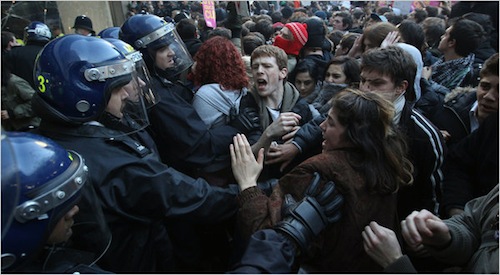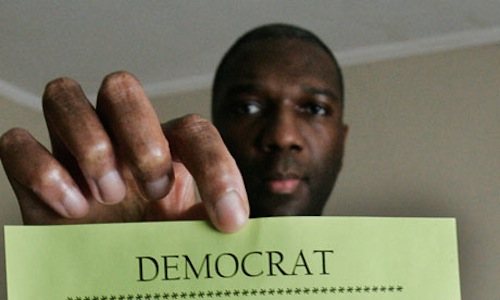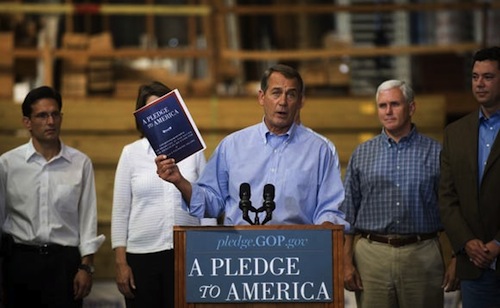Come Tuesday, Clarence Thomas will have passed five years on the Supreme Court without asking a question or offering his opinion during oral arguments. That’s unusual. According to the New York Times, “in the 20 years that ended in 2008,* ![]() the justices asked an average of 133 questions per hourlong argument, up from about 100 in the 15 years before that.” Antonin Scalia has been known to interrupt petitioners to read aloud from Garfield. Yet Thomas, described as “gregarious” in his personal life, has not spoken from the bench—except to read prepared statements of majority opinion—since 2006. In addition to pointing out the fundamental inadequacies of the nickname “Silent Clar,” such long reticence begs a question: why?
the justices asked an average of 133 questions per hourlong argument, up from about 100 in the 15 years before that.” Antonin Scalia has been known to interrupt petitioners to read aloud from Garfield. Yet Thomas, described as “gregarious” in his personal life, has not spoken from the bench—except to read prepared statements of majority opinion—since 2006. In addition to pointing out the fundamental inadequacies of the nickname “Silent Clar,” such long reticence begs a question: why?
Tag Archives: Tea Party
British tuition riots emphasize what a crappy deal Americans are getting

Angry protestors outside Conservative Party headquarters in London, plus one girl who is having a great time
Yesterday, rioters in London attempted to overrun the building that houses Britain’s Conservative Party, as 52,000 demonstrators gathered near Parliament to protest a proposed increase in university tuition. In an effort to cut spending by $130 billion, the national government has proposed raising the maximum schools can charge from $9,600 to $14,400 a year.* That idea proved unpopular. As the Times puts it, “Tuition is a politically sensitive subject in Britain, where universities are heavily subsidized by the government. Until the late 1990s, when the Labour government introduced tuition, students paid nothing to attend college.” Under the new plan, students would borrow the money from the government—as they do now—and begin paying back the loans at 9% of their wages once they began making more than $38,000 a year. After 30 years, the loan would be wiped out, regardless of whether it had been paid or not. In England, this plan prompted rioting in the streets. Meanwhile, out-of-state tuition at the University of Michigan costs $20,000 a year ($35,000 for Harvard,) and students start paying back their loans immediately whether they can find a job or not. I am beginning to suspect that we’re getting a raw deal.
That idea proved unpopular. As the Times puts it, “Tuition is a politically sensitive subject in Britain, where universities are heavily subsidized by the government. Until the late 1990s, when the Labour government introduced tuition, students paid nothing to attend college.” Under the new plan, students would borrow the money from the government—as they do now—and begin paying back the loans at 9% of their wages once they began making more than $38,000 a year. After 30 years, the loan would be wiped out, regardless of whether it had been paid or not. In England, this plan prompted rioting in the streets. Meanwhile, out-of-state tuition at the University of Michigan costs $20,000 a year ($35,000 for Harvard,) and students start paying back their loans immediately whether they can find a job or not. I am beginning to suspect that we’re getting a raw deal.
Greene loses!
Democratic Senate hopeful Alvin Greene suffered a heartbreaking upset yesterday in South Carolina, losing to Republican Jim DeMint by the narrowest of 34-point margins. Across the country—as one New York Times writer described it, the “wide battleground that stretched from Alaska to Maine,” which I think means Canada—Greene’s surprise loss prefigured Republican gains, including a 60-seat pickup in the House of Representatives. “We’ve come to take our government back,” newly-elected Senator Rand Paul told his victory party. “They say that the U.S. Senate is the world’s most deliberative body. I’m going to ask them to deliberate on this: The American people are unhappy with what’s going on in Washington.” Mr. Paul then shouted an obscenity after an aide told him where the Senate is located.
Video captures happiest 4 minutes of Christine O’Donnell’s life
I assume that, by now, the numerical minority of you who did not send me links to Christine O’Donnell’s First Amendment gaffe yesterday have heard about it. In a debate with Chris Coons before, of all people, an audience of law students, the Delaware Senate candidate demanded to know “where in the Constitution” is the separation of church and state. After her opponent recited the establishment clause (pretty much from memory, although he missed a couple of words,) she remained incredulous, saying, “You’re telling me that’s in the First Amendment?” Newspaper accounts were beautiful, but they miss what is perhaps the best part: the four or so minutes after O’Donnell sticks Coons with her “where in the Constitution?” question but before she realizes it’s a gaffe. During that time, she smirks at the crowd, mugs during her opponent’s answers and generally acts like she’s just checkmated Vladimir Nabokov. It’s an almost physically painful study in dramatic irony, and it captures the essence of Christine O’Donnell.
Close Readings: The preamble to the Pledge to America
Last week, the Republican Party released the full text of its Pledge to America, a document that explains the GOP’s plan for fixing what’s wrong with this country—most of which rhymes with “the hawk’s pajamas,” if you get their meaning. The content of the Pledge is not exactly a thunderbolt. It advocates the same policies that Republicans have been pushing for the last two to 74 years, as well as certain politically unlikely plans, such as eliminating the Environmental Protection Agency, that qualify less as a promise than a threat. The Republican Party’s pledge to America is that they will lower taxes and deregulate industry, plus repeal health care. While the notion of an America in which each session of Congress devotes itself to undoing the legislation passed by the previous session is exciting, most the Pledge itself is unremarkable. What is remarkable is its introduction—500 words of hyperbolic nationalism that are the subject of today’s Close Reading.




